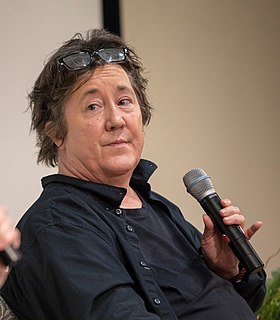A Quote by Stephen Mallinder
We were iconoclastic. We weren't there to sort of follow the trends really. So it was important that we were making a statement against that.
Related Quotes
Some people get medals and awards and all that, and maybe not intentionally - maybe the world is making them do it - but they sort of just follow what they were doing. Repeat or follow what they were doing all their lives, in their style of music or whatever. In my case, I always try to start from scratch. It's very nerve-wracking actually, but it's interesting.
Fashion is not just about trends. It's about political history. You can trace it from the ancient Romans to probably until the '80s, and you can see defining moments that were due either to revolutions or changes in politics. At the end of the Roman era, there was this whole move against togas, because that was the signifier of the Roman Empire. In the same way, the '60s were a reaction against the '50s and so on. But now we've been feeding on a sort of cadaver. At the moment, we're just endlessly recycling the past.
I doubt that there are many screenplays of movies that either of us have seen over the past 10 years that were first drafts, or were the work of purely one person. In my world, the actors and the director are all made of paper, and they do exactly what I say. I feel much more in control of the finished work. I feel like the statement that I'm making - even though it's in a medium by no means as glamorous or as widely recognized as film - is at least the statement that I wanted to make. That's a lot more important to me than the allure of working for Hollywood.
When I came overseas, I realized that there are many ideologies and many trends, and it's also very hard to produce honest art and honest literature. I decided that I didn't want to follow any of these ideologies or trends, because that's also a kind of pressure that doesn't allow absolute freedom. So I decided that I was only going to produce works that were satisfactory to me, and that meant not following any trends and being anti-ideological.
The question about the Salafi is an important question as I say in Arab Awakening, and have often repeated since. I am really underlining the importance of this, because we really don't have very good memories. Remember - the Taliban in Afghanistan were not at all politicised in the beginning. They were just on about education. And then they were pushed by the Saudi and the Americans to be against the Russian colonisation, and as a result they came to be politicised.
My parents are from the South - they were both born in Birmingham - so my dad saw R.E.M. really early on when they were playing college stuff in Athens. He had a bunch of their cassettes from the '80s, and when I was 8, 9, or 10, those were the sort of things that were around the cassette player in the living room.
Once you know what you want and what is important for you to achieve, also define the values associated with it. What is important? That is something a lot of entrepreneurs pass by too quickly. For us, the things that were important were, No. 1, customer success. Nothing is more important to us than making sure every customer is successful in our service.




































